Are you a nurse looking to land your dream job? Crafting an impressive nursing resume is crucial in showcasing your skills, experience, and qualifications to potential employers. In this comprehensive guide, we will walk you through the process of creating an impressive nursing resume that will stand out from the competition. From formatting to highlighting your achievements and certifications, we’ve got you covered.
Choosing the right resume format
The first step in creating an impressive nursing resume is selecting the appropriate format. The most common format for nursing resumes is the reverse-chronological format, which presents your work experience in reverse order, starting with the most recent. This format allows hiring managers to quickly assess your career progression and relevant experience. However, there are other formats you can consider, such as functional and combination formats, depending on your specific circumstances.
When it comes to formatting your resume, keep these key points in mind:
- Margins: use one-inch margins on all sides to ensure a clean and professional appearance.
- Font: choose a clear and legible font, such as Arial or Times New Roman, in a size of 11-12pt for the main text and 14-16pt for headings.
- Line spacing: use a line spacing of 1.0 or 1.15 to enhance readability.
- Resume length: aim to keep your resume concise and focused, ideally fitting on one page. If you have extensive experience, you may extend it to two pages, but avoid exceeding this limit whenever possible.
Impressive nursing resume examples
Crafting a compelling resume summary
Your resume summary is the first section that hiring managers will see, so it’s essential to make a strong impression. A well-crafted resume summary provides a concise overview of your qualifications, experience, and career goals. It should highlight your key skills and accomplishments, demonstrating your suitability for the nursing position.
Consider the following examples when crafting your nursing resume summary:
Experienced and compassionate Registered Nurse with a proven track record of providing high-quality care to diverse patient populations. Skilled in assessing patient needs, implementing evidence-based treatments, and collaborating with interdisciplinary teams. Dedicated to delivering exceptional healthcare and promoting positive patient outcomes.
Patient-focused nursing student with a strong academic background and hands-on experience in various healthcare settings. Currently pursuing a Bachelor of Science in Nursing degree with a passion for providing compassionate and personalized care. Seeking to leverage my knowledge and skills to contribute to a dynamic healthcare team.
Remember, your resume summary should be tailored to the specific job you are applying for and highlight your unique strengths and qualifications.
Showcasing your skills
The skills section of your nursing resume is a crucial component that demonstrates your proficiency and expertise in various areas. Be sure to include both hard skills, which are technical and job-specific, and soft skills, which are interpersonal and transferable.
Here are some essential nursing skills to consider including in your resume:
Hard skills for nursing resume
- Assessing vital signs and monitoring patients
- Administering medication and treatments
- Performing wound care and dressing changes
- Operating healthcare software and electronic medical records (EMR)
- Conducting patient assessments and physical examinations
- Assisting in medical procedures and surgeries
- Implementing infection control protocols
- Providing patient education and counseling
- Collaborating with interdisciplinary teams
- Responding to emergency situations and providing critical care
Soft skills for nursing resume
- Effective communication and interpersonal skills
- Empathy and compassion for patients
- Critical thinking and problem-solving abilities
- Strong attention to detail and organizational skills
- Ability to work well in a team and collaborate with colleagues
- Adaptability and flexibility in fast-paced environments
- Strong work ethic and dedication to patient care
- Time management and prioritization skills
- Cultural sensitivity and diversity awareness
Tailor the skills section to match the specific requirements of the job you are applying for. Review the job description and incorporate relevant keywords to ensure your resume stands out to hiring managers.
Highlighting your work experience
The work experience section of your nursing resume is where you can showcase your professional achievements and demonstrate your ability to provide high-quality care. When describing your work experience, focus on your specific responsibilities, accomplishments, and the impact you had on patient care and outcomes.
Use the following guidelines to effectively highlight your work experience:
- Position title: clearly state your job title and any relevant specialties or areas of focus.
- Dates: include the period of employment for each position, starting with the most recent.
- Company name: provide the name of the healthcare facility or organization you worked for.
- Responsibilities & Achievements: describe your key responsibilities and highlight specific achievements or contributions. Use action verbs and quantify your accomplishments whenever possible. For example, instead of saying “Assisted with patient care,” say “Provided direct care for up to 10 patients per shift, ensuring their comfort and well-being.”
- Unit types and specialties: include information about the specific units or departments you worked in, such as ICU, ER, or pediatric care. This helps employers understand your areas of expertise.
By focusing on your accomplishments and the impact you made in your previous roles, you can effectively demonstrate your value as a nurse.
Showcasing your education and certifications
The education section of your nursing resume is a critical component that helps employers evaluate your academic qualifications and professional development. Include relevant degrees, certifications, and licenses that demonstrate your expertise and commitment to nursing.
Here’s how to effectively showcase your education and certifications:
- Degree type & Major: clearly state the degree you obtained and your major (e.g., Bachelor of Science in Nursing).
- University name: include the name of the educational institution where you earned your degree.
- Years studied: indicate the duration of your studies, including the start and end dates.
- GPA, honors, courses: include your GPA if it is 3.5 or above, as well as any honors or relevant coursework.
In the certifications section, highlight any additional certifications or licenses you have obtained. Include the certification name, issuing organization, and the date of certification. This may include certifications such as Basic Life Support (BLS), Advanced Cardiovascular Life Support (ACLS), or specialty certifications in areas such as critical care or pediatrics.
Additional sections to enhance your nursing resume
To make your nursing resume stand out even more, consider including additional sections that showcase your professional achievements, affiliations, or relevant skills. These sections can help you differentiate yourself from other candidates and demonstrate your commitment to growth and development.
Here are some additional sections you can consider adding to your nursing resume:
- Professional affiliations: list any professional organizations or nursing associations you belong to, such as the American Nurses Association (ANA) or the National Student Nurses’ Association (NSNA).
- Awards & Recognitions: highlight any awards, honors, or scholarships you have received throughout your career or academic journey.
- Conferences & Courses: include any relevant conferences, workshops, or continuing education courses you have attended to stay updated on the latest advancements in nursing.
- Languages: if you are bilingual or multilingual, mention your language skills, as this can be an asset in providing care to diverse patient populations.
- Volunteer experience: if you have volunteered in healthcare settings or nursing-related programs, include this information to showcase your commitment to serving others.
Including these additional sections can help paint a more comprehensive picture of your qualifications and dedication to nursing.
Final tips for creating an outstanding nursing resume
As you work on crafting your nursing resume, keep the following tips in mind to ensure it is as strong and impactful as possible:
- Tailor your resume: customize your resume for each job application to highlight the most relevant skills and experiences for the specific role and employer.
- Use keywords: incorporate keywords from the job description to optimize your resume for applicant tracking systems (ATS) and increase your chances of getting noticed by hiring managers.
- Proofread: check your resume thoroughly for any grammatical or spelling errors. A polished and error-free resume shows attention to detail and professionalism.
- Keep it concise: aim to keep your resume concise and focused, highlighting the most relevant information. Avoid unnecessary details or extensive explanations.
- Update regularly: regularly update your resume to include any new certifications, skills, or accomplishments as you progress in your nursing career.
By following these tips and crafting a well-organized and compelling nursing resume, you can increase your chances of landing your ideal nursing position.
Good luck with your nursing resume, and may you find success in your career as a dedicated and compassionate nurse!
Photo by Los Muertos Crew from Pexels



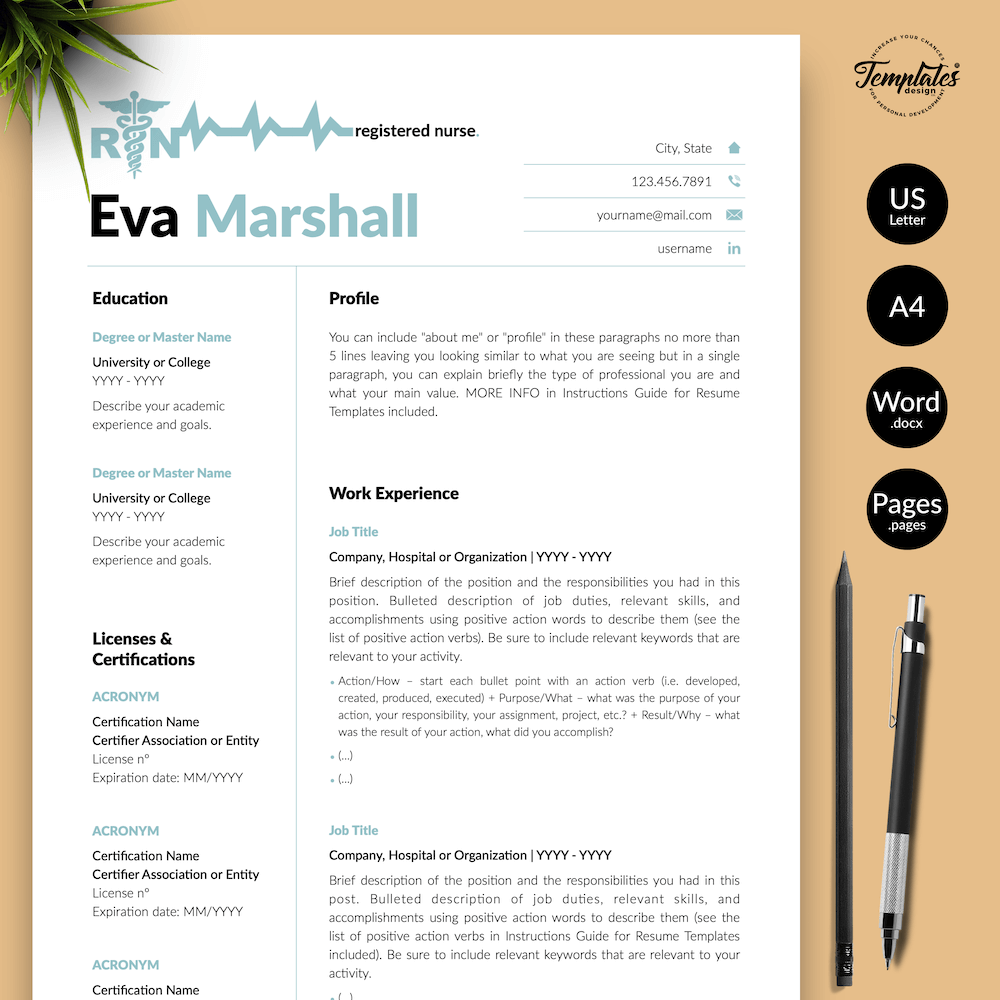
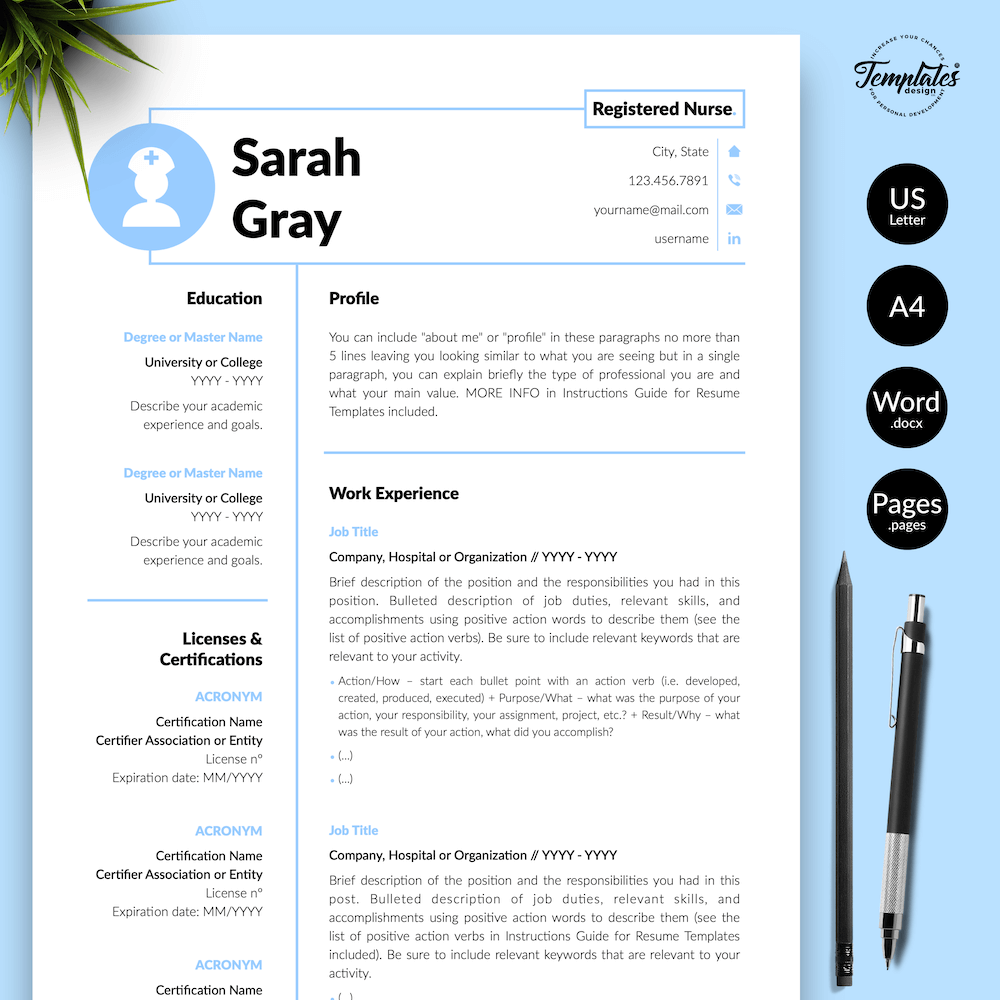
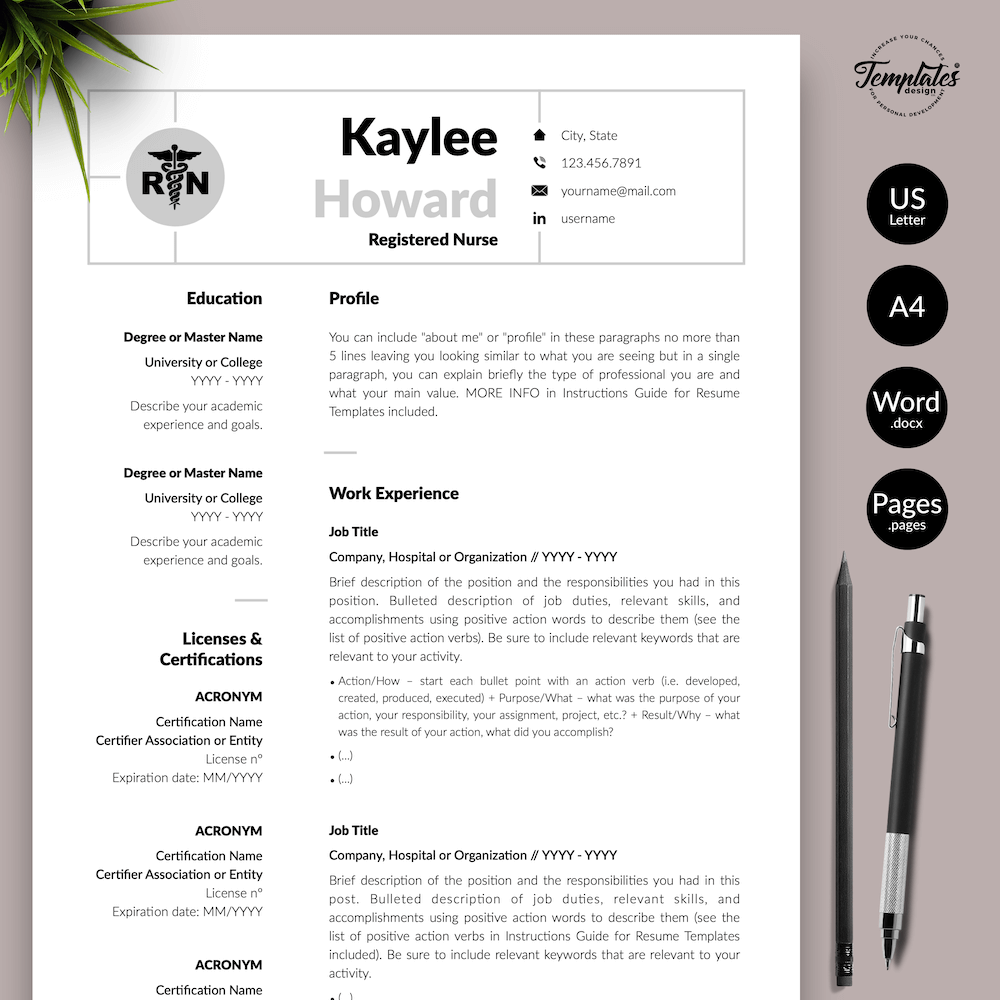

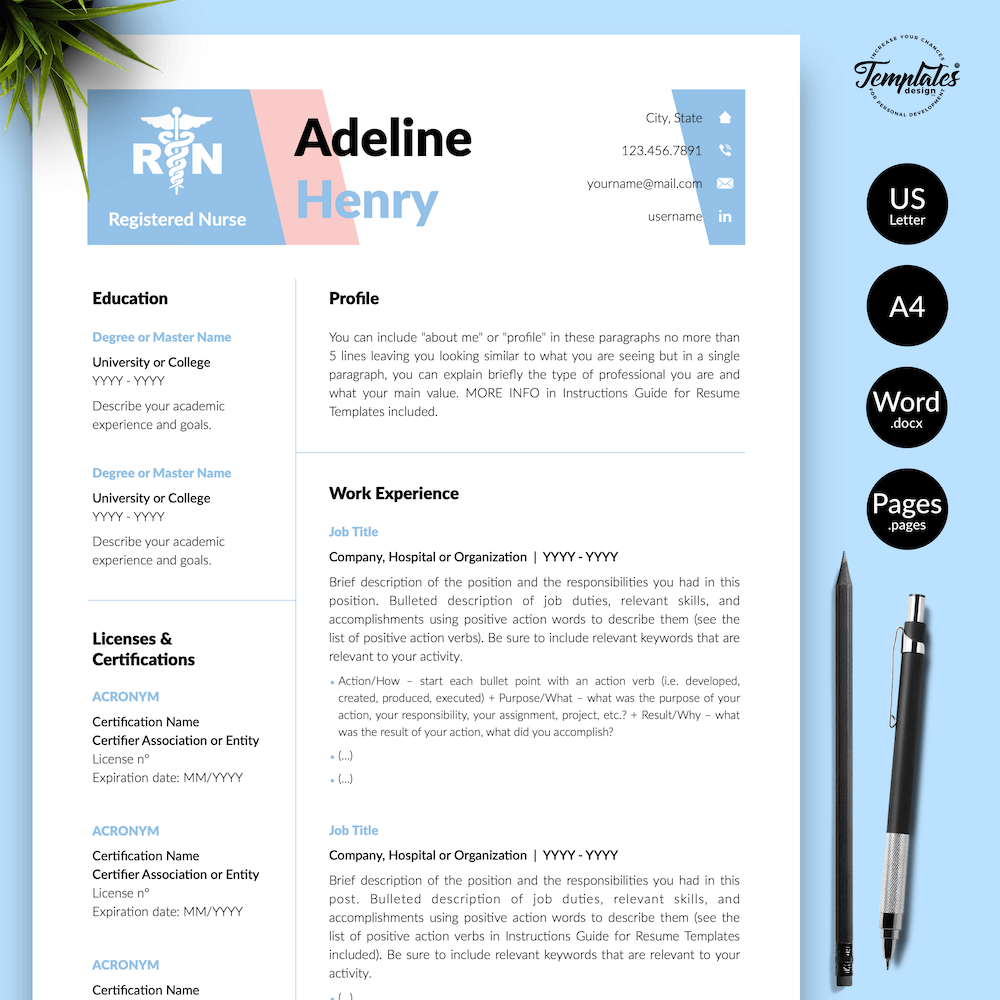
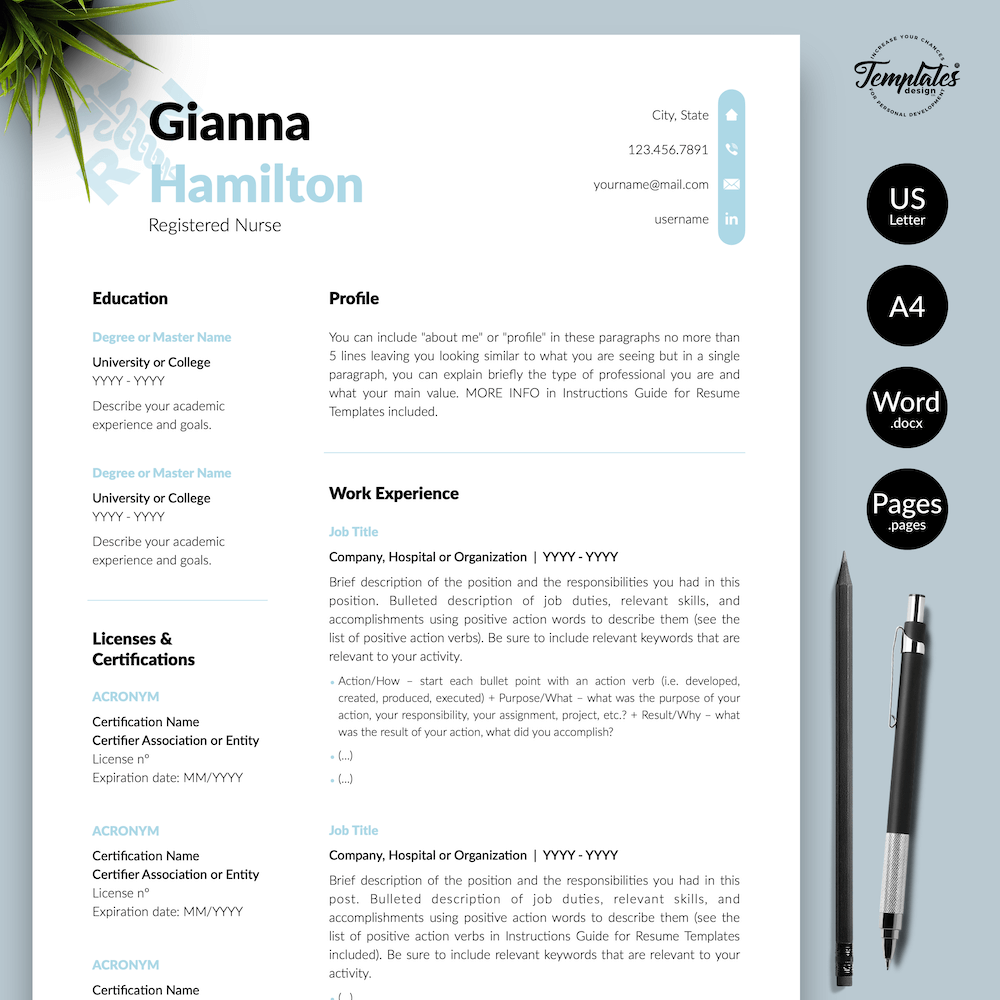
Leave A Comment